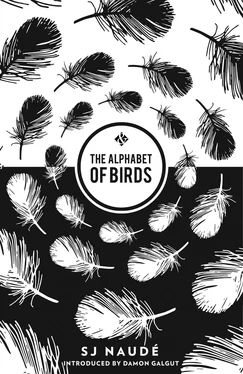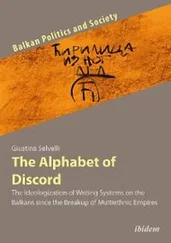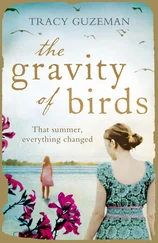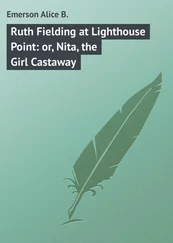When she arrives in the city from the airport, the door to her flat is open. The security gate is hanging askew from its hinges. The flat is virtually empty. The furniture is gone, the sink ripped out of the bathroom. Her collection of musical instruments from North and West Africa has been stolen; the same goes for her LPs and old-fashioned turntable. Her clothes, the kaftans and costumes in which she used to perform in the VNLS days. The whole lot. Someone must have stripped the place repeatedly. In the bedroom the bowl of cat food has been left behind, largely uneaten.
‘Flame!’ she calls for the cat.
Nothing. All that has been left behind, in the bedroom cupboard: her Casio synthesiser from the 1980s. She feels light. This is all she owns now: one suitcase and a dinky keyboard.
She gets in her car and drives to the Free State. To the farm where she grew up. She drives without stopping, until the sharp winter light makes her eyes burn. In town she stops at the co-op. She no longer knows anyone behind the counter or amongst the shelves. She buys nasturtium seeds, a little fork and garden gloves.
The homestead is somewhat neglected, but unchanged. The garden is dry and flowerless.
‘This was my mother’s garden,’ she says when a woman comes out, without first greeting her. ‘I’d like to replant a corner of it. One small bed of flowers. Do you mind?’
The woman’s hands are in the pockets of a stretched cardigan. She looks stupefied, or perhaps just bored. She looks at the little fork in Ondien’s hands.
‘An overloaded gesture, I know, sentimental. Still, grant me this. I have the seeds with me. And a small garden fork. If I may only borrow a little water …’
‘Do what you like,’ the woman says. She turns around and enters the house.
Ondien drops onto her knees, in the garden where her mother once walked and sang. Clichéd arias, always. Puccini or Verdi. ‘Sì, mi chiamano Mimì’ from La Bohème , ‘Ah, fors’è lui’ from La Traviata . The sun burns her back, the tears come.
When she is done, she rinses her hands at an outside tap. She leaves without speaking to the dull woman again. When she is too tired to drive any further, she stops and sleeps in a motel. All night trucks brake and depart in front of her window.
Someone’s grimy sleeping bag on the kitchen floor. The pane of the kitchen window has been removed. A stranger has spent the night in her flat. When dusk falls, she awaits the guest. She waits until late. No one comes. She goes outside in the dark to see if someone is hiding there. The garden has become neglected in the weeks since Mrs Zuckermann — Mrs Z, as she calls her — moved out. Mrs Z’s children are in New York and Toronto. It has been a decade since they last visited. Mrs Z writes them letters that go unanswered. Her friends are either dead or have emigrated to Israel or the US. Not a soul to look after things in her absence, no one to administer anything. Two months have passed since Ondien last paid rent.
The grass is long around Ondien’s feet, the leaves of shrubs dry between her fingers. In a corner of the garden sparks are flying. She approaches. Something is hanging from the electric fence, but she cannot see what it is. She fetches the key to the main house. In Mr Zuckermann’s little library with shelves full of books on Zionism, she finds a small ladder. She carries it out and climbs onto it, stretches a hand towards the thing hanging there. It’s rubbery to the touch. Flame the cat.
In the kitchen light she studies the pink carcass, the skin stripped off completely. It smells of death. It looks too small to be her cat — its neck like a twig that one could snap between two fingers — but it is. The stomach has been cut open, it has been gutted. (Was someone planning to eat it?)
She cannot immediately decide what to do with the carcass. There is music in her head that first needs to be purged. For now, she will put it in a plastic bag and leave it outside, behind the flat.
For the remainder of the evening she composes as if in a fever. The march is finished, she is working on a new movement to precede it: on the horizon clouds are approaching. There is the roll of percussion, then the wind instruments take over, stately and skirling, pushing against the dark. Then death, the abrupt entrance of the quarter chords. It is the sound of a swarm of locusts: hatching in the underworld, expanding like gas. The air around their wings stirs the Styx’s water when they cross. The swarm has been sent to fetch the dead. They arrive and devour the body where it is cooling down. Then they alight for the flight back. They carry the body away in ten thousand pieces, diluting it like a cloud. All these unusual things she hears. The Casio is next to her. With one hand she is tinkling — the tinkling is standing in for a sweeping, surging orchestra. The funeral march is now but one movement of her piece; it is becoming a requiem.
By four in the morning her fingers are stiff and cold. She lies down in the sleeping bag for some warmth, too tired to be bothered by the rancidness. When she gets up, her body is sore from the hard floor. She is itching. Perhaps there are bedbugs in the bag. Not really a liveable place any longer, this flat. But, yes, it is free accommodation. To be a white homeless woman in Johannesburg, to be sleeping under bridges, cannot be a joke. She suddenly realises she has not eaten since getting off a plane two days ago.
The gardener no longer comes, no one has been paying him. The pool has been emptied, probably the last thing he did before absconding. The concrete sides are baking in the winter sun. Scratchy with tiredness and thirst she walks out on the sun-bleached diving board. She tests its bounce, jumping up and down a little, as if she is on the verge of diving. It creaks as it moves. A tuft of grass has already grown through a crack in the bottom. Ondien goes into the house, finds a few tins of cheap meatballs, things that Mrs Z used to feed her domestics. Then she fetches a little spade and a flowerpot from Mrs Z’s garage. In it she plants the leftover nasturtium seeds.
Early evening. A Highveld storm is building. There is a flash between cloud and wire: the electric fence has been struck. Late evening, when she is lying in the rancid sleeping bag, she hears someone breaking out the burglar bars in front of Mrs Z’s windows. She is lying there like a mummy, waiting for the intruders to come and do her harm. She can hear footsteps back and forth through the garden as they carry things off. But the footsteps pass, they do not come to her. Either they do not know she is there, or an unspoken understanding is developing: she does not bother them and they do not bother her.
The next morning she enters the house. Wires are hanging where the television has been ripped out. Across the carpets lie the muddy marks of feet, there is a broken plate on the kitchen floor. She takes what she needs. What is left in the pantry she packs in a box. She takes pots and pans, plates and cutlery. Sheets. She cannot find any blankets: probably all stolen. She carries two chairs and a mattress through the garden, to her flat.
She visits Mrs Z in the care home. She is lying with her chin on a white sheet.
‘Be sure to pay your rent into my account,’ she says.
‘Of course, Mrs Zuckermann. Promptly, every month.’
‘You are like a daughter to me.’
Mrs Z knows as well as she that there is no truth in this. Their relationship was purely commercial. And now it is in a vague no-man’s-land: the strongest ties she has with Mrs Z are the things she steals from her house in order to survive. And the fact that she is a squatter in her back garden. She does not even know why she is standing here with the ungerminated flowers in her hands. Guilt, probably. If she were ever to bring flowers again, they would have to be bought with the proceeds from what she is stealing from Mrs Z’s home. There is no money left.
Читать дальше












